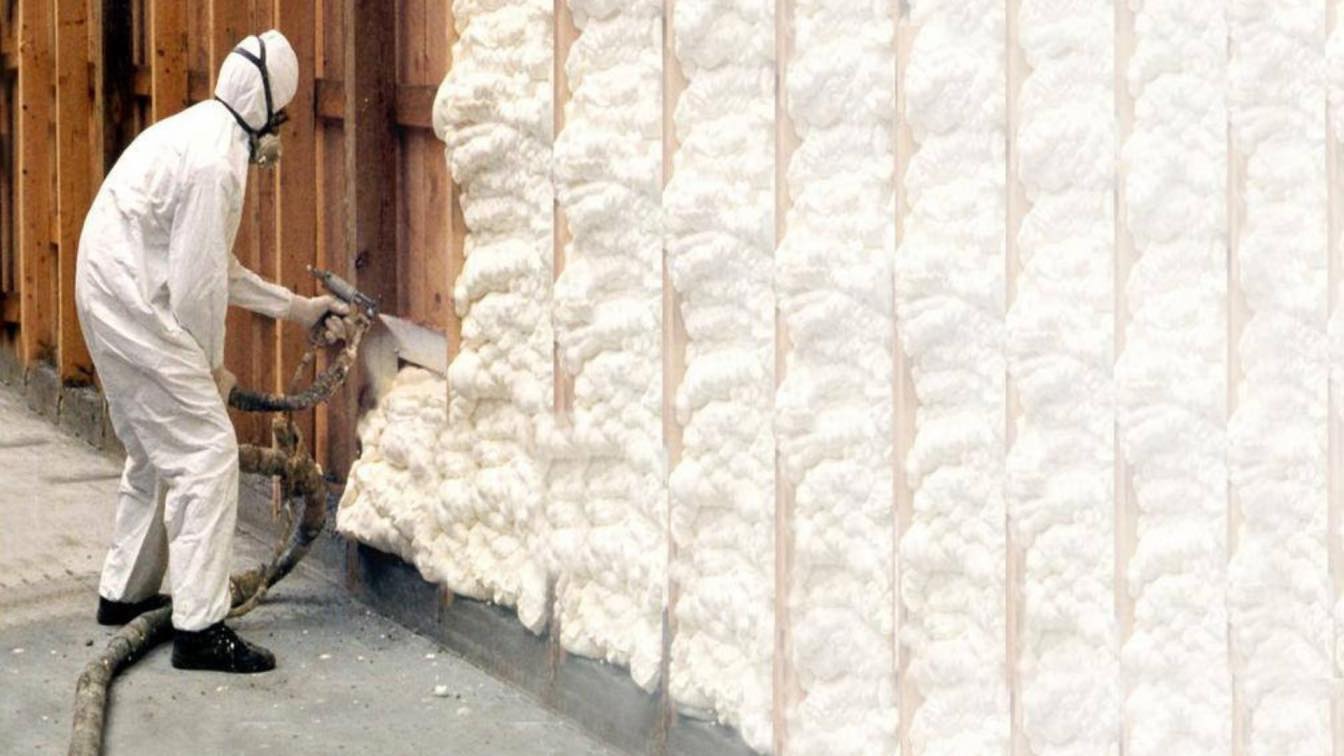Did you know that up to 40% of a home's energy can be lost through poor insulation? Imagine your hard-earned money disappearing into thin air, literally. This is where spray foam insulation comes in. With its impressive ability to seal gaps and crevices, it can significantly reduce energy loss, improve comfort levels, and save you money on utility bills.
Spray foam insulation is a popular choice among homeowners due to its exceptional energy efficiency properties. In fact, studies have shown that it can lower heating and cooling costs by up to 50%. By creating an airtight barrier between your home and the outside elements, spray foam insulation prevents drafts and keeps the temperature consistent throughout your living space. No more chilly winters or sweltering summers - just optimal comfort all year round.
Not only does spray foam insulation offer remarkable energy savings, but it also boasts environmental benefits. By reducing your reliance on heating and cooling systems, you are decreasing your carbon footprint and contributing to a greener future for our planet. Additionally, this type of insulation has an extended lifespan compared to traditional options like fiberglass or cellulose. Its durability ensures that you won't have to worry about replacement or maintenance costs anytime soon.
While the initial cost of installing spray foam insulation may be higher than other options, the long-term savings make it a worthwhile investment. On average, homeowners who choose spray foam insulation enjoy a return on investment within three to five years due to reduced energy bills. Moreover, professional installation ensures proper application for maximum effectiveness and longevity. So why wait? Discover how spray foam insulation can transform your home into an energy-efficient haven while providing long-lasting benefits for both your wallet and the environment
Energy Efficiency and Comfort Improvement
You'll experience a significant increase in energy efficiency and overall comfort once you have spray foam insulation installed in your home. Spray foam insulation is known for its excellent thermal performance, which helps to create an airtight seal that minimizes air leakage and heat transfer. This means that your home will be better insulated against both hot and cold temperatures, resulting in reduced energy usage throughout the year.
One of the main benefits of spray foam insulation is its ability to provide substantial energy savings. By preventing air leakage and reducing heat transfer, this type of insulation can help to lower your heating and cooling costs significantly. In fact, studies have shown that homes with spray foam insulation can achieve energy savings of up to 50% compared to traditional insulation options. Additionally, the airtight seal created by spray foam insulation also helps to improve indoor air quality by keeping out pollutants such as dust, pollen, and mold spores.
With increased energy efficiency comes improved overall comfort in your home. The consistent temperature provided by spray foam insulation ensures that there are no drafts or cold spots, allowing you to enjoy a comfortable living environment all year round. Furthermore, the superior soundproofing properties of spray foam can help reduce noise transmission from outside sources like traffic or neighbors. By investing in spray foam insulation for your home, you not only benefit from lower energy bills but also experience enhanced comfort levels and improved indoor air quality.
Transitioning into the subsequent section about 'long-term cost savings,' it's worth noting that while spray foam insulation may require a higher upfront investment compared to other types of insulations, its long-term benefits far outweigh the initial costs.
Long-term Cost Savings
Saving money in the long run is a no-brainer when it comes to opting for spray foam insulation. Not only does it provide excellent energy savings, but it also offers a great return on investment. Spray foam insulation has one of the highest R-values (a measure of thermal resistance) among all insulation materials, which means it provides exceptional thermal performance and reduces heat transfer through your walls and roof. This helps to keep your home warmer in winter and cooler in summer, reducing the need for excessive heating or cooling. As a result, you can expect significant energy savings on your utility bills.
According to studies conducted by the U.S. Department of Energy, homeowners who choose spray foam insulation can save up to 50% on their heating and cooling costs compared to traditional insulation methods. The initial cost of installing spray foam insulation may be higher than other options, but its long-term cost savings far outweigh the upfront investment. On average, homeowners can recoup their expenses within 3-5 years through reduced energy bills alone. Additionally, spray foam insulation has a lifespan of over 30 years, meaning you will continue to enjoy these cost savings throughout the life of your home.
As we transition into discussing the environmental benefits of spray foam insulation in the subsequent section, it is important to note that saving money is just one aspect of its overall value proposition. While reducing energy consumption and enjoying significant financial savings are compelling reasons to choose this type of insulation for your home, there are also many environmental benefits that make it an even more attractive option . These environmental benefits include reducing greenhouse gas emissions, minimizing air and water pollution, conserving natural resources, and promoting sustainability.
Environmental Benefits
By choosing spray foam insulation, homeowners can not only save money in the long run but also contribute to a greener and more sustainable environment. Spray foam insulation is made from renewable materials, such as soy or castor oil, making it an eco-friendly choice for homeowners who are conscious of their carbon footprint. By opting for this type of insulation, you are actively reducing your reliance on fossil fuels and decreasing your overall energy consumption.
The environmental benefits of spray foam insulation extend beyond its renewable materials. This type of insulation creates an airtight seal in your home, preventing air leakage and reducing the need for excessive heating or cooling. As a result, you can significantly reduce your energy usage and lower your carbon emissions. Additionally, spray foam insulation has been shown to have a high R-value, meaning it provides excellent thermal resistance compared to other types of insulation. With its superior insulating properties, spray foam helps maintain consistent indoor temperatures throughout the year while minimizing heat loss or gain.
Transitioning into the subsequent section about 'durability and longevity', it's important to note that the benefits of spray foam insulation go beyond its environmental advantages.
Durability and Longevity
Investing in spray foam insulation is like fortifying your home's armor, providing long-lasting protection against the elements and ensuring your comfort for years to come. One of the key factors that contribute to its durability is the rigorous durability testing conducted on spray foam insulation products.
These tests simulate various weather conditions and evaluate how well the insulation holds up over time. Results have shown that spray foam insulation excels in these tests, maintaining its effectiveness even after years of exposure to extreme temperatures, moisture, and other environmental stressors.
In addition to its exceptional performance in durability testing, spray foam insulation also boasts minimal maintenance requirements. Once installed properly, it requires very little upkeep compared to other types of insulation. Unlike traditional insulations that may sag or settle over time, leading to gaps and decreased efficiency, spray foam remains intact and maintains its initial R-value for an extended period. It doesn't require regular replenishment or replacement like some insulations do.
Transitioning into the subsequent section about 'professional installation and cost factors', it's important to note that while durability and longevity are significant advantages of spray foam insulation, professional installation plays a crucial role in maximizing these benefits.
Professional Installation and Cost Factors
When it comes to maximizing the advantages of spray foam insulation, professional installation is key in ensuring optimal performance and long-term savings. The installation process of spray foam insulation requires expertise and precision. It involves the use of specialized equipment and techniques to ensure proper application and coverage. A professional installer will have the knowledge and experience to assess your specific needs, recommend the appropriate material options, and execute a flawless installation.
The installation process begins with a thorough assessment of your home's insulation needs. This includes evaluating existing insulation, identifying areas prone to air leaks or heat loss, and determining the best approach for insulating each area. Once this assessment is complete, the installer will discuss material options with you. There are different types of spray foam insulation available, including open-cell and closed-cell foams, each offering unique benefits depending on your specific requirements.
After selecting the appropriate material, the professional installer will begin the application process. This typically involves spraying the foam directly onto surfaces such as walls, ceilings, or attics. The foam expands upon contact, filling all gaps and voids to create a seamless barrier against drafts and moisture infiltration. Throughout the installation process, precise measurements are taken to ensure consistent thickness and coverage for maximum effectiveness.
While there may be initial costs associated with hiring a professional installer for spray foam insulation, it is important to consider the long-term savings that can be achieved through reduced energy consumption. Properly installed spray foam insulation can significantly lower heating and cooling costs by creating an airtight seal that prevents conditioned air from escaping your home. Additionally, its durability ensures that it will last for many years without needing replacement or maintenance.
When considering spray foam insulation for your home, investing in professional installation is crucial to reap its full benefits. The expertise of a trained installer guarantees an efficient installation process tailored to your specific needs while utilizing suitable material options for optimal performance. By choosing professional installation services for spray foam insulation in your home, you can enjoy long-term savings and a more comfortable living environment.





